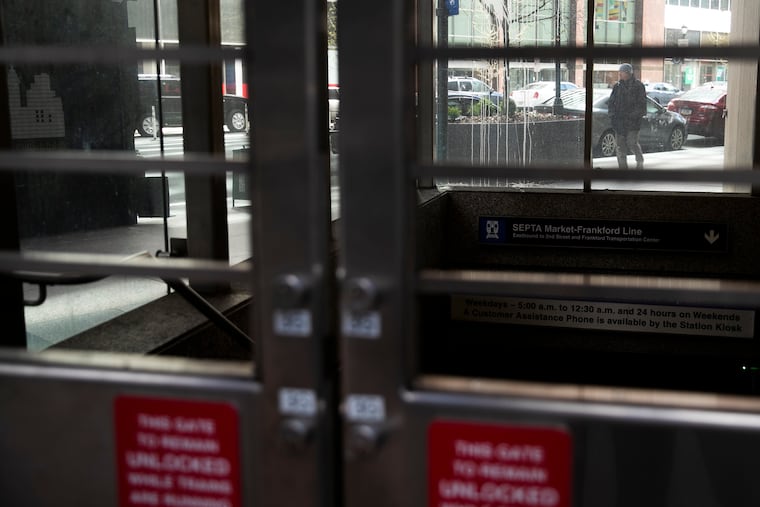SEPTA faces an unprecedented financial challenge. A plunge in Pa. Turnpike traffic may make it tougher.
"I don’t think any of us know what the new normal is going to look like," said Rich Burnfield, SEPTA’s treasurer and deputy general manager.

For four years, Merv Russell, a Penn Medicine nurse, consistently took SEPTA from the Fern Rock Transportation Center, leaving about 4:30 a.m. But in March, as the coronavirus pandemic worsened, he started driving.
He hates commuting by car to West Philly, he said, but made the decision for his health.
“I know I will go back,” said Russell, 56, of Mount Airy. “Once they go back to the regular schedule, the Express trains are running, and knowing that it’s just going to be safe and clean.”
SEPTA’s thinking about people like Russell as it anticipates what ridership will look like after the pandemic ebbs. When will it come back, and how will it be different?
SEPTA projects at least a $300 million loss of revenue through the end of June 2021 — a conservative estimate. And as rock-bottom ridership challenges SEPTA’s future, its leaders worry, too, about another source of funding from the Pennsylvania Turnpike, which typically accounts for more than a quarter of its annual capital budget.
“What’s going to be the new normal?” said Richard G. Burnfield, SEPTA’s treasurer and deputy general manager. “I don’t think any of us know what the new normal is going to look like.”
Trouble along the turnpike
By law, the Turnpike Commission is required to send $450 million annually to the Pennsylvania Department of Transportation to help support public transportation, of which about $178 million flows to SEPTA in quarterly $44.5 million payments, according to the authority.
The turnpike made its full quarterly payment in April, but it may have to delay payment in July based on drops in revenue, as first reported by PennLive. Toll revenue could decline by about $118 million through May, the Turnpike Commission has projected.
Postponed payment could delay some SEPTA projects, like substation, bridge, and station improvements, or Elwyn-to-Wawa Regional Rail service restoration. The authority has proposed a $640 million capital budget for the fiscal year starting in July.
>>UPDATE: SEPTA expects project delays after PennDot OKs Turnpike payment extension
SEPTA "will be anxious to hear what the commission is thinking in terms of their ability to make that payment in July,” Burnfield said.
PennDot has been working with Gov. Tom Wolf’s office and the turnpike on solutions and “to ensure that all obligations are met,” said spokesperson Alexis Campbell.
“This situation underscores the importance of identifying sustainable, long-term funding solutions for transit and transportation overall,” Campbell said in a statement.
A 2018 truckers lawsuit against the turnpike that threatened the funding stalled about 40 improvement projects last year, including its $1 billion trolley modernization plan. The obligation, however, for the turnpike to provide the support is set to expire in 2022. To compensate, officials and business leaders are eyeing taxes and fees as possible fixes to fill the multimillion-dollar hole.
The funding challenge existed “way before anyone had ever heard of COVID,” said Barry Seymour, executive director of the Delaware Valley Regional Planning Commission. But SEPTA is going to have to rethink its bigger capital projects after the pandemic, he said.
“There’s the must-haves and there’s the would-like-to-haves," he said, “and the must-haves will go first.”
A crisis for transit
The coronavirus has posed the biggest challenge for transit agencies perhaps since World War II, said Mimi Sheller, professor of sociology at Drexel University and director of the Center for Mobilities, Research and Policy there.
“But this complete budget collapse is unbelievable, and clearly, I think, requires some kind of public intervention to support all of our transit systems,” Sheller said.
The $25 billion in CARES ACT federal funding was intended to bring some relief. SEPTA received $643 million to be spent over the next 12 to 18 months. It has worked to stem losses with pay reductions and layoffs, but can’t “cut [its] way out of this crisis," the authority said in a statement.
SEPTA has planned a $1.53 billion operating budget for the upcoming fiscal year, with $481 million coming from passenger revenue and $780 million from state subsidies.
Asked if SEPTA would have to consider service cuts, Burnfield said the federal relief will help maintain adequate levels.
An analysis from TransitCenter, a New York City-based foundation that supports improving public transit, says the CARES funding will only provide months of breathing room for transit agencies in large metro areas.
“It’s almost guaranteed that they will be in need of further relief before some of the smaller agencies in the nation,” said Ben Fried, TransitCenter communications director.
What SEPTA will look like on the other side is unclear, but ridership and service are unlikely to return with a flip of a switch. SEPTA said it will still need to take into account significant employee absenteeism related to the coronavirus, which is already forcing its “lifeline” schedule.
It is putting together a recovery plan, knowing Southeastern Pennsylvania is likely to be among the last areas in the state to reopen. The White House is reviewing guidelines for reopening transit, according to the Washington Post.
While the pandemic poses additional challenges, SEPTA has “weathered a number of these storms before,” said Erick Guerra, an associate professor in city and regional planning at the University of Pennsylvania.
“I think it will bounce back. The question is, how long does it take?” Guerra said. “How much misery does it cost?”